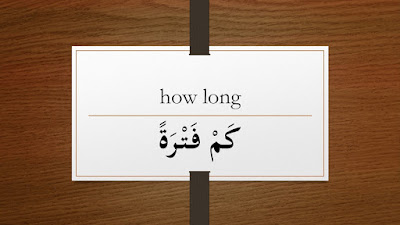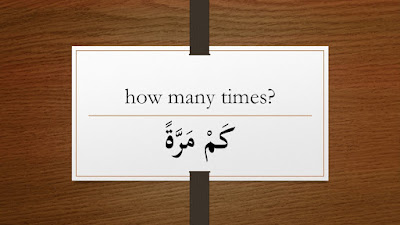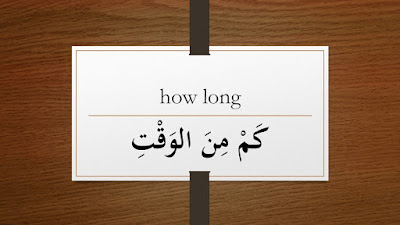Arabic Expression: How long & How many times?
Table of Content [View]
Today,we are going to learn how to ask "how many times (how often)" and "how long (how much time)" in Arabic.
In this lesson, I will show you the sentence examples, then explain you the translation in English, finally you will see a word by word translation.
How many times question in Arabic
how many times : كَمْ مَرَّةً
1.
كَمْ مَرَّةً خَتَمْتَ الكِتَابَ؟
How many times did you finish reading the book?
Word by word translation & explanation
a. خَتَمْتَ means you finished.
The root verb is خَتَمَ - يَخْتِمُ
b. الكِتَابُ = the book.
the final letter ends with harakat fat-ha (الكَتَابَ ) because its position in the sentence as an object (مفعول به)
So, خَتَمْتَ الكِتَابَ means finished reading the book.
2.
كَمْ مَرَّةً تَحْضُرُ إِلَى المَدْرَسَةِ فِي هَذَا الأُسْبوعِ؟
How many times do you come to the school this week?
word by word translation
a. تَحْضُرُ إِلَى means you come to ...; you attend to ...
the root verb is حَضَرَ - يَحْضُرُ
b. المَدْرَسَةُ means the school.
the final letter harakat ends with kasrah,because it's preceded by harf jar إِلَى
So, تَحْضُرُ إِلَى المَدْرَسَةِ means you come to the school.
c. الأُسْبُوعُ = a week
the final letter ends with harakat kasra because it's preceded by harf jar فَي
So فِي هَذَا الأُسْبُوعِ means in this week.
3.
كَمْ مَرَّةً تَتَّصِلُ بِوَالِدَيْكَ فِي الأُسْبوعِ؟
How many times do you call your parents this week?
word by word translation
a. تَتَّصِلُ بِ means you communicate with; you get in touch with; you call ...
The root verb is اِتَّصَلَ - يَتَّصِلُ
b. وَالِدَانِ = parents
In the sentence, وَالِدَانِ is marfu'. It becomes majrur because preceded by harf jar بِ . So, it becomes بِوَالِدَيْنِ
وَالِدَيْنِ is dual form of a noun (مثنّى).
The rule of dual form in the case of possessive form (مضاف and مضاف إليه .) : we have to eliminate the nun (ن).
Therefore, the final form is بِوَالِدَيْكَ .
بِوَالِدَيْكَ means to your parents.
تَتَّصِلُ بِوَالِدَيْكَ means you communicate with your parents; you get in touch with your parents; you call your parents.
c. أُسْبُوعٌ , I've explained at point number 2.
Answer examples:
ثَلَاثَ مَرَّاتٍ = three times
مَرَّةً بَعْدَ مَرَّةٍ = frequently; repeatadly; time and time again
مِرَارً وَتِكْرَارً = many times; again and again
"How long " in Arabic
how long : كَمْ مِنَ الوَقْتِ
Another Arabic expression for how long is : كَمْ فَتْرَةً
1.
كَمْ مِنَ الوَقْتِ يُمْكِنُ لِي أَنْ أَتَعَلَّمَ اللُّغَةَ العَرَبيَّةَ حَتَّى إجَادَتِهَا ؟
How long can I learn Arabic until mastering it?
a word by word translation
a. يُمْكِنُ لِ= possible; can; be able to
The root verb is أَمْكَنَ - يُمْكِنُ
لِيْ means for me. So, يُمْكِنُ لِيْ means possible for me or I can.
b. أَنْ is a letter to connect two verbs.
It makes verb after أَنْ mansuub (the harakat is fat-ha).
يُمْكِنُ is verb, أَتَعَلَّمُ is verb. These two verbs are connected by letter أَنْ . So, it becomes يُمْكِنُ لِيْ أَنْ أَتَعَلَّمَ
c. أَتَعَلَّمُ means I learn.
The root verb is تَعَلَّمَ - يَتَعَلَّمُ
in the sentence, أَتَعَلَّمُ is preceded by letter أَنْ , therefore it becomes mansuub => أَنْ أَتَعَلَّمَ
d. اللُّغَةُ العَرَبيَّةُ = Arabic language
Why in the sentence above, we write اللُّغَةَ العَرَبيَّةَ?
Because اللُّغَةُ العَرَبيَّةُ is maf'ul bih (the object of the verb أَتَعَلَّمُ , so the harakat becomes fat-ha.
e. حَتَّى = until; up to
حَتَّى is harf that makes noun after it majrur.
f. إجَادَةٌ = mastery; expert
The root (basic word) of إجَادَةٌ is أَجَادَ - يُجِيدُ
أَجَادَ - يُجِيدُ means excel; master
In the sentence, إجَادَةٌ is preceded by harf حَتَّى , so it becomes إِجَادَةٍ
g. هَا in the sentence is damir (pronoun) that means it.
هَا refers to اللُّغَةُ العَرَبيَّةُ
So, حَتَّى إجَادَتِهَا means : until mastering it (until mastering Arabic).
2.
كَمْ مِنَ الوَقْتِ يَسْتَغْرِقُ السَّفَرُ مِنْ مَكَّةَ إِلَى جَاكَارْتَا؟
How long does it take to travel from Mecca to Jakarta?
a word by word translation and explanation
a. يَسْتَغْرِقُ = take (a particular amount of time); occupy; fill
The root verb is اِسْتَغْرَقَ - يَسْتَغْرِقُ
b. السَّفَرُ = travel
c. مِنْ = from
d. مَكَّةُ = Mecca (the name of holy city in Saudi)
In the sentence, مَكَّةُ become majrur because preceded by har jar مِنْ. So, it becomes مَكَّةَ
مِنْ مَكَّةَ = from makka (Mecca).
Notes:
مَكَّةُ has no tanwin (ism ghair munsarif/mamnu' min as-sarf). The rule regarding this type of noun:
- Marfu' condition = ends with harakat damma
- Majrur condition = ends with harakat fat-ha
- Mansub condition = ends with harakat fat-ha
e. إِلَى = to
it's harf jar. It makes a noun after it becomes majrur.
f. جَاكَارْتَا = Jakarta (the name of city, capital city of Indonesia).
This type of noun has same harakat for all condition. So, marfu, majrur, or mansub condition, we say جَاكَارْتَا
3.
إِذَا رَكِبْنَا الحَافِلَةَ كَمْ مِنَ الوَقْتِ يَسْتَغْرِقُ السَّفَرُ إِلَي جَاكَارْتَا ؟
If we ride the bus, how long does it take to travel to Jakarta?
word by word translation and explanation
a. إِذَا = if
b. رَكِبْنَا = we ride
The root verb is رَكِبَ - يَرْكَبُ
c. الحَافِلَةُ = bus
in the sentence, الحَافِلَةُ is object, so it becomes mansub => الحَافِلَةَ
d. يَسْتَغْرِقُ السَّفَرُ means : the travel takes ... (amount of time)
I've explained this at point number 2.
e. إِلَي جَاكَارْتَا means : to Jakarta
============================
I recommend you to learn another Arabic expression lesson:




No comments:
Post a Comment